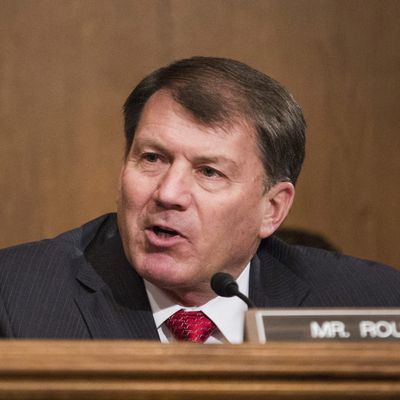
Mitch McConnell’s very bad week may have just gotten worse. Even as he tries to get 50 votes for some version of the Better Care Reconciliation Act with a nip here and a tuck there, members of his conference are suddenly asking basic questions about its size and shape.
Bloomberg reports that Susan Collins — already a difficult “get” for McConnell — is wondering aloud why BCRA repeals taxes that aren’t by any stretch of the imagination a burden on health-care premiums. She specifically mentioned the repeal of a 3.8 percent surcharge on investment earnings, which would cost a cool $172 billion and strictly benefit individuals with over $200,000 and couples with over $250,000 in income.
But far worse than Collins raising this taboo-among-Republicans subject is that she was echoed by Mike Rounds of South Dakota, a solid member of the GOP conference who has not been on anybody’s list of BCRA troublemakers. He not only would like to kill this big tax cut, but has designs on the restored revenue:
Rounds called for using the savings to expand tax credits for Americans who are currently ineligible for assistance because their spouses have employer plans that don’t cover them.
An equally bad sign for McConnell is that Tennessee’s Bob Corker, another solid Republican, is now publicly pointing out that the combination of tax cuts for the wealthy and deep Medicaid cuts creates a less than ideal impression about the GOP’s sense of fairness:
“I want to make sure that we’re not in a situation where we’re cutting taxes for the wealthy and at the same time, basically, for lower income citizens, passing a larger burden on to them,” Corker said.
Told that what he described is what the CBO projects would happen, he responded, “So that needs to be overcome then, doesn’t it?”
Yikes. That is more or less a direct attack on the basic structure of BCRA.
Now you can ask where these wise lawmakers have been all this time, as their House and Senate colleagues developed AHCA and BCRA. But if nothing else, these late reactions indicate that McConnell may have bigger problems than he can solve by tossing treats to malcontents from the slush fund of excess deficit savings the CBO score of BCRA gave him. If the revolt against tax and Medicaid cuts spreads, the backlash from conservatives who value precisely those features of the bill could be intense. And the rock that Paul Ryan and Mitch McConnell have so laboriously pushed to within inches of the legislative summit could roll all the way back down.






























